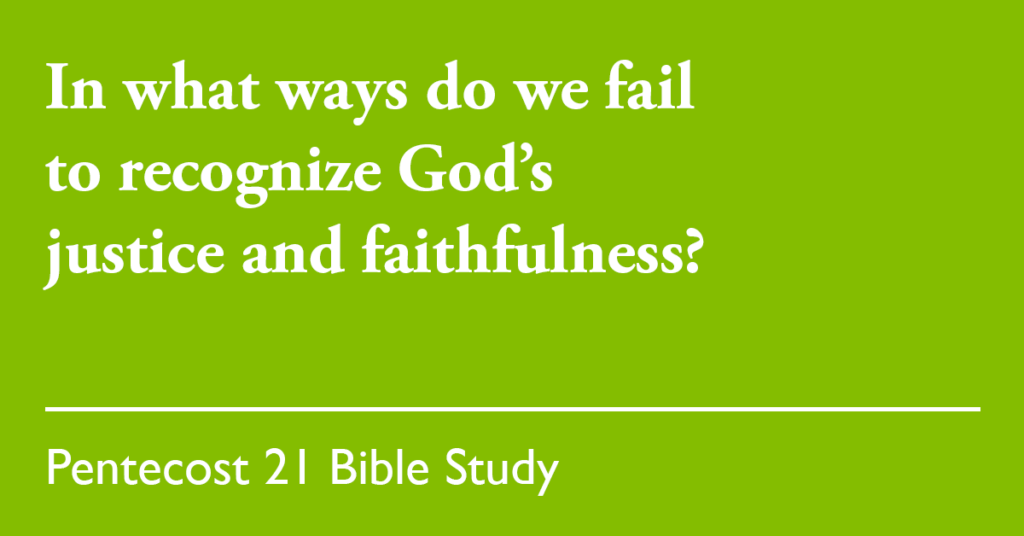This page is available in: Español
Bible Study: Proper 26 (C) – 2022
October 30, 2022
[RCL] Habakkuk 1:1-4; 2:1-4; Psalm 119:137-144; 2 Thessalonians 1:1-4, 11-12; Luke 19:1-10

Habakkuk 1:1-4; 2:1-4
Habakkuk’s prophecy begins with pointed questions addressed to God. Habakkuk sees injustice all around. He cries to God, but feels that God does not listen, or does not save. To hear Habakkuk tell it, God even makes Habakkuk witness wrongdoing and evil, and nothing is done about it. In short, Habakkuk is a prophet for our times, who seethes at injustice and isn’t afraid to demand where God is. The whole first chapter is a description of just such a trying situation. Far from giving up in frustration or surrendering to injustice, however, Habakkuk resolves to remain faithful. In return, God promises justice, and that the proud will be humbled, and the righteous will live.
- What situations or issues today make you wonder where God is?
- Just as Habakkuk resolved to stand at his watch-post, how can you remain faithful to God and God’s mission in the face of injustice?
Psalm 119:137-144
In this section of Psalm 119, the Psalmist is vexed that God’s word is not being followed properly. God and God’s decrees are described as good, upright, and just. For the Psalmist, following God’s word is both an obligation and a delight. Despite being “small” and “of little account,” the author of this song to God follows God’s word, and prays that all creation will do likewise. Moreover, the Psalmist seeks understanding of God’s word, and that understanding is equated with life. God sits in righteous judgment of all, but many simply do not realize, or do not understand. Yet even in distress, the author revels in God’s commandments.
- In what ways do we fail to recognize God’s justice and faithfulness?
- What is the benefit of recognizing oneself as “small” and “of little account” in relation to God?
- What understanding might we pray for, in relation to God’s will for us and for the world?
2 Thessalonians 1:1-4, 11-12
In the beginning of his second letter to the Thessalonians, Paul gives thanks for the faithfulness and love found in that community. He says that he holds them up as an example to everyone he meets, and also that he continues to pray for them, that they might continue along the path that they seem to be on. In addition to faith and love, however, Paul prays for resolve for them, and works of faith. He prays that these will occur by God’s power, but it is clear that he thinks these a naturally outgrowth or next step following from faithfulness. It is by resolve and good works that Paul says the name of Jesus will be glorified in the community.
- Is there someone whose faithfulness and love you admire? Have you thought about praying for them, that they might continue on this path?
- Have you ever asked anyone to pray for your faith, or that you might be more loving?
- What works do you feel that God may be leading you to? How might you work to glorify the name of Jesus in your community?
Luke 19:1-10
The story of Zacchaeus is an interesting one. Jesus simply happens to be passing through Jericho when he sees Zacchaeus in a sycamore tree and tells him to come down so that Jesus can stay at his home that evening. Zacchaeus, of course, is a rich man and a tax collector, and for this reason is a known sinner in the community. He has profited off of his neighbors. And yet, Jesus still comes to him. In the end, Zacchaeus gives away half of his possessions to the poor and pays back anyone he has wronged, but he promises to do so only after he encounters Jesus. Jesus uses Zacchaeus as an example, proclaiming that he, too, is a son of Abraham. While we often speak (and rightly so) of a preferential option for the poor. Zacchaeus, however, is something of a counterexample, showing us that while we should indeed privilege the marginalized, that does not necessarily mean that we should marginalize the privileged.
- How do we as Christians bring the Gospel to all, even those we might think to be sinners?
- What privileges might you have that could be used to spread the Good News?
This page is available in: Español
Don’t forget to subscribe to the Sermons That Work podcast to hear this sermon and more on your favorite podcasting app! Recordings are released the Thursday before each liturgical date.
Receive Free Weekly Sermons That Work Resources!
This page is available in: Español


